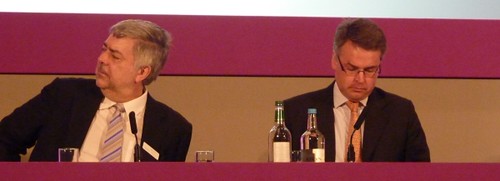I am by no means an apologist for the Government, but it seems to me that colleagues who have seized on the absence of ICT in the recent White Paper on the future of teaching as indicative of the Government's lack of interest in, or commitment to, ICT may have been premature. As an ex-Ofsted inspector I would say that absence of evidence is not evidence of absence. The White Paper failed to mention electricity as well, but I'm sure the Government would be surprised if anyone took that to mean the Government thought schools should be run on gas!
I wonder if, in fact, the lack of attention to ICT is more of an indication of a view that ICT in schools is already in place, so we can turn our attention elsewhere? This is certainly the impression I have come away with having spoken to certain people. Mr Gove does, in fact, recognise the importance of technology. In his keynote opening speech at the Education World Forum, he said:
Because with every year that passes we are privileged to enjoy new insights about how best to organise schools, how best to inspire pupils, how to use new technology, how the brain absorbs knowledge, how teachers can best motivate, how parents can better support, how governments can best invest. (my emphasis)
 Dominic Savage (left) and Tim Loughton at BETT 2011At the BETT show, Tim Loughton, the Parliamentary Under-Secretary of State for Children and Families, placed a great deal of emphasis on educational technology. Well, he would, of course, given the occasion, which was the Leadership conference at the BETT show, but I thought he gave cause for optimism -- although I know some of my colleagues disagreed with me when I expressed this.
Dominic Savage (left) and Tim Loughton at BETT 2011At the BETT show, Tim Loughton, the Parliamentary Under-Secretary of State for Children and Families, placed a great deal of emphasis on educational technology. Well, he would, of course, given the occasion, which was the Leadership conference at the BETT show, but I thought he gave cause for optimism -- although I know some of my colleagues disagreed with me when I expressed this.My cause for optimism and my colleagues' cause for pessimism were one and the same. Mr Loughton placed a great deal of emphasis on e-safety, which he said was a 21st century issue. He and his colleagues have even had a visit and talk by Tanya Byron.
Well, you can see why colleagues involved in e-safety issues would be upset by such a viewpoint. Many of us have tried hard, over the years, to convince people that e-safety is a whole school issue, not just an ICT issue, and I have long said that phenomena such as cyber-bullying are a subset of bullying, not a class of their own. From that point of view, the Government's approach appears to be putting the clock back, or to be a diversion from wider, and possibly even more important, issues -- such as how to teach young people to be safe rather than assuming that all can be solved with the right sort of internet filtering software.
I take a more sanguine view. The White Paper talks about the idea of teaching schools, akin to teaching hospitals. They present an opportunity for the ICT community to influence what is taught and what is held to be best practice. These teaching schools could be beacons of educational technology excellence.
As for the e-safety angle, surely an savvy ICT person would use that as a virtual foot in the door? Whilst showing government representatives or any other officials who visit your school your marvellous e-safety measures, why not show them the oher wonderful things you have in place too? The same applies when writing about educational technology.
Perhaps I am a hopeless optimist, but I think that if the Government is willing to listen to someone like Tanya Byron, it suggests that they willing to listen, full stop. Besides, dismissing other people's (perceived) point of view out of hand doesn't seem to me to be a particularly intelligent approach; nor does it seem likely to guarantee any kind of dialogue, let alone a fruitful one.
This article first appeared on 4th February 2011 in Computers in Classrooms, the free e-newsletter for educational ICT professionals.
Don't forget to contribute to the National Curriculum Consultation -- deadline: 14th April 2011.
